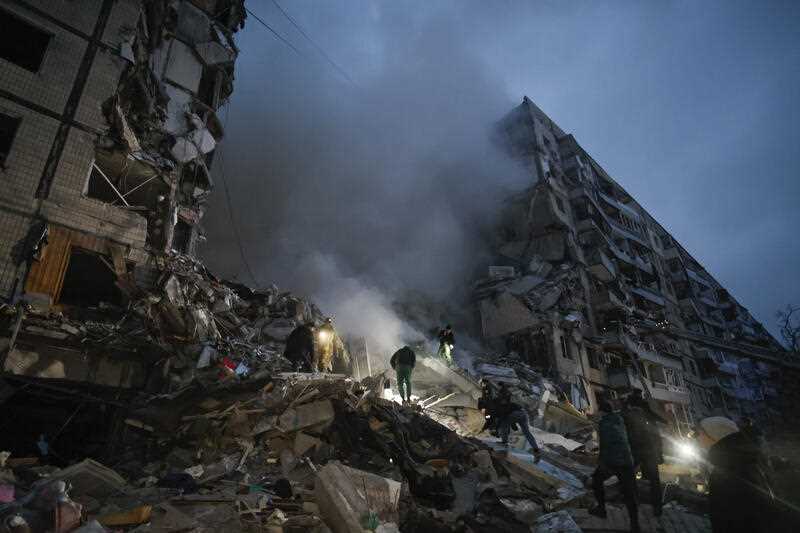Russia has unleashed a major missile attack on Ukraine, smashing a nine-storey apartment block in the city of Dnipro, killing at least five people and striking vital energy facilities across the country, officials said.
The nation’s Energy Minster German Galushchenko warned the strikes that targeted the majority of the regions would make the coming days “difficult.”
Fifteen people were rescued after being buried under a section of an apartment block that was reduced to rubble in the east-central city of Dnipro on Saturday, where smoke billowed into the sky, the deputy head of Ukraine’s presidential office said.
“Tragedy. I’ve gone to the site…. We will be going through the rubble all night,” said Borys Filatov, mayor of the rocket-making city on the Dnipro river.
At least 27 people, including six children, were also wounded in the attack, with more people were still trapped under the rubble, the regional governor said.
Pictures showed firefighters putting out a blaze around the carcasses of some cars. A broad chunk of the apartment block was missing. The exterior of the rest of the building was badly damaged.
Wounded people were carried away on stretchers in footage circulated by Ukrainian public broadcaster Suspilne.
Russia, which invaded Ukraine last February, has been pounding its energy infrastructure with missiles and drones since October, causing sweeping blackouts and disruptions to central heating and running water as winter bites.
Missiles on Saturday also struck critical infrastructure facilities in the eastern region of Kharkiv that borders Russia and the western region of Lviv that borders Poland, officials said.
The entire Kharkiv region lost power after officials were forced to order emergency power cuts. In Lviv, disruptions to electricity and water supplies were also possible, regional governor Maxim Kozytsky said.
“Thanks to efficient air defence work in Kyiv, damage to critical infrastructure objects was avoided,” Serhiy Popko, head of the city military administration, said.
Moldova’s interior ministry said missile debris had been found in the north of the country near the Ukraine border following the air strikes.
The attack on Saturday came hours after a smaller-scale missile attack hit critical infrastructure in Kyiv and the eastern city of Kharkiv. The first attack was unusual because missiles struck their targets before the air raid siren even sounded. No one was reported hurt then, but missile debris caused a fire in one area and houses were damaged outside the capital, officials said.
Ukrenergo, which runs Ukraine’s power grid, said its workers were racing to fix damage and that the network was struggling with a power deficit caused by earlier attacks even though it was -2 Celsius in Kyiv, only mildly cold.
Colder weather generally puts more strain on the system because energy consumption goes up.
DTEK, the biggest private electricity company, introduced emergency blackouts in several regions.
Residential infrastructure was also hit in the village of Kopyliv just outside the capital. The windows and roofs of 18 privately owned houses were shattered or damaged by the blast, Oleksiy Kuleba, the regional governor, said.
Commenting on the first attack, Air Force spokesperson Yuriy Ihnat said Russia’s missiles had likely been fired along a high, looping ballistic trajectory from the north, which would explain why the air raid siren did not sound.
Ukraine is not able to identify and shoot down ballistic missiles, he told the Ukrainska Pravda online outlet.
In Ukraine’s northeast, two S-300 missiles struck the city of Kharkiv near the Russian border early on Saturday, according to regional governor Oleg Synehubov.
The attacks hit critical energy and industrial targets in the Kharkiv and Chuhuev district of the region, he said.
By Olena Harmash and Tom Balmforth in KYIV



